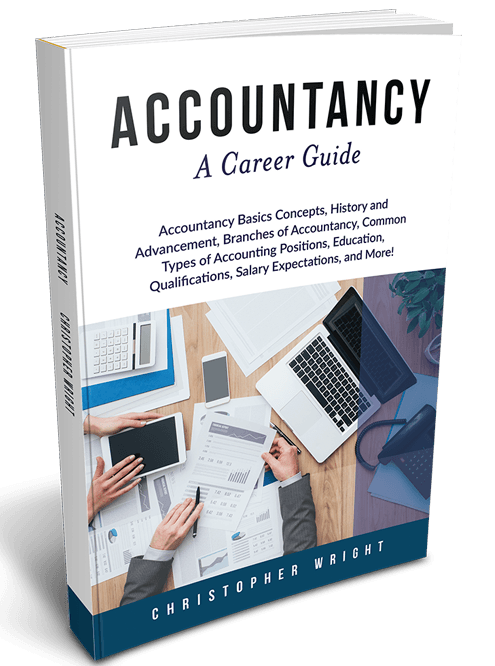CHAPTERS
Navigate to chapter
► Chapter One: Introduction to Accountancy
► Chapter Two: Accounting Throughout the Ages
► Chapter Three: Branches of Accountancy
► Chapter Four: Common Types of Accounting Positions
► Chapter Five: More Jobs in the Market
► Chapter Six: Financial Services Regulation
► Chapter Seven: Qualifications for Aspiring Accountants
► Chapter Eight: The Road to Employability and Credibility
► Chapter Nine: What It Takes to Become a Certified Public Accountant
► Chapter Ten: Landing Your First Job
Chapter One: Introduction to Accountancy

Lots of people have misjudged accountancy to be one of the most boring professions to go into and this has been expressed time and again through jokes, puns, and stories passed on from one to another. And to solidify statements with random observations of people who deal with numbers, there have been countless references to accountants and accountancy being a boring, mundane job that many think is almost laughable. In order to understand the misguided conception and misinformation of many about this noble career, we’ve come up with a short book on guiding you to know accountancy better.
Accountancy goes back to thousands of years and can be detected in historical documentations to have been used by civilizations as far back as the ancient world existed. The little-known and unsung founding father of accounting was the Italian, Luca Pacioli, who was also the first to publish his writings on double-entry booking work and who formally brought about the introduction of accountancy to the Italian society. Luca Pacioli had never really ever gotten the credit that was due for him, and it’s about time we talk about him a little bit more so that you can appreciate the subject that makes the world go ‘round so to speak.
Accountancy is a practice that has been around for thousands of years and can be traced back to ancient Mesopotamia. Accounting came about and is associated with counting, writing, and ancient auditing systems used by the ancient Babylonians and Egyptians. A financial management manuscript was written by the Indian philosopher, economist and teacher, Chanakya. The financial management book titled “Arthashastra” it was first published in India. The Arthashastra contained detailed features on the upkeep of financial accounts for the Sovereign State of the Mauryan Empire (322 BCE-180 BCE).
It was in the nineteenth century when Scotland first produced the profession of chartered accountants in the country. Back then, the chartered accountants in Scotland were part of the same firms and associations as lawyers who offered accounting and legal services to their clients. It was during this time when accounting turned into a standard profession with professional organizations from England, in 1880, combined to form the Institute of Chartered Accountants in England and Wales.
In more recent years, the subject of accountancy was placed under bad light in the wake of the Enron debacle of 2002. The expose of the messy business with the company put the accounting profession in very bad light with the revelation of important and vital documents being shredded to hide anomalies. This was a big blow to the sector of people in the accounting field and it was indeed a bleak spell for many. But that is just one part of the history. During the course of you reading this book, you shall discover the rich history of accountancy a little bit more and will discover how building a career in accountancy can help you become a great contributor to society and its betterment.
Accountants are some of the most dedicated people to doing their job right. They are vital to many of us if we would just give a minute or two of thought to the work they provide. They are woven from a different sort of fabric, that, the knit of their personalities are geared toward making a positive difference, contributing to society in a substantial manner. Accountants come into their career with great expectations of themselves and the task they have been allotted.
Have you been thinking about starting a career in the finance sector? Perhaps you have been exposed to the profession through knowing people who have built their life’s work crunching numbers. Your reasons may be as straightforward as you being keen on working with numbers. Or, you could have possibly heard about the stability of the profession and its lasting power of employability from family and friends.
Whatever your reasons are, you’ve come to the proper place to get to know more about the profession of accounting and what you would need to give and invest, time and money, in order to attain your goal of becoming a key player in the bigger picture of taxes and finances. We have also compiled recent statistical data that gives you a clearer picture of accounting and accountants in the workforce, their numbers, the foreseen employability of accountants, and the median annual wages earned by them.
Getting an Education
Going into accountancy, whether you are beginning an entry level job and attending higher learning on the side, you will need to give good thought of your schooling schedules. You may choose to attend classes at a physical school in your region or you may opt to take online courses. Either way, make sure that your choice of studying coincides with your lifestyle and daily schedule. You will need to consider a shift in your daily routine to figure in time in order to get your accountancy courses completed. Study options these days have given many students of different mastery and courses the luxury of flexibility in terms of schedule.
If you are looking to advance your career by getting a PhD upon completion of a master’s program, expect to put in a lot of hard work and gather an extensive work experience. Doing so will help open many doors of opportunities. CPA exams are comprehensive and you will need to pass each and every one of the four required examinations in order to get licensed.
Fortunately, there are many online accounting programs that are available for all the different degree levels from associate degrees, bachelor’s degrees programs, as well as MBA and Mace degrees. In addition, distance learning programs prepare and equip an individual to get ready for the Certified Public Accountant Exam. An accounting student’s coursework will largely depend on the degree level they are enrolled. Subjects could include:
• General or advanced studies of financial management and accounting
• Auditing
• Taxation
• Cost accounting and management
• Economics and information systems
• Classes in systems technology may be part of the curriculum, as well as
• Business law and ethics
Your Efforts
The effective use of your study time will be vital to your gaining knowledge on and about accounting. You will be studying systems, modern and ancient, you shall be working on fine tuning skills in computation, manually and with the use of various computers, you shall learn how to work with others, specifically in the area of research and investigation in relation to finances. One will have to expect that there will be long hours of work seasonally once they have successfully gained proper clients and employment.
Aside from numbers, and collaborative work, expect to work with a lot of papers, be ready to challenge your filing skills. An accountant is tasked to work in a company balancing its books, or they could be employed independently by clients who need their expertise and know-how. There is an honest truth about numbers that brings clarity to any economic situation of a business or an individual. You will need to bring your honed skills, not many possess, to the table each time.
Depending on how dedicated one is to completing their studies, it could take a person anywhere between 2 to 6 years to complete their education.
There are those who complete their studies all the way up to acquiring an MBA and then there are others who enroll in 2 year associate degree programs allowing them entry level positions in companies. Some of these individuals would gain experience by learning through working and may take up additional courses to get their bachelors degree. Bachelor degrees typically take 4 years to complete. Master’s degree program typically take one to two years to complete. Make sure that you get credit that could shave off time on your studies.
Cost of Education
The monetary cost of getting a bachelor’s degree, associate degree, and an MBA will fluctuate depending on the institution one chooses to attend. Here are some important facts you need to know regarding paying for an accounting course:
Continue Reading…
Want to read the entire thing?


